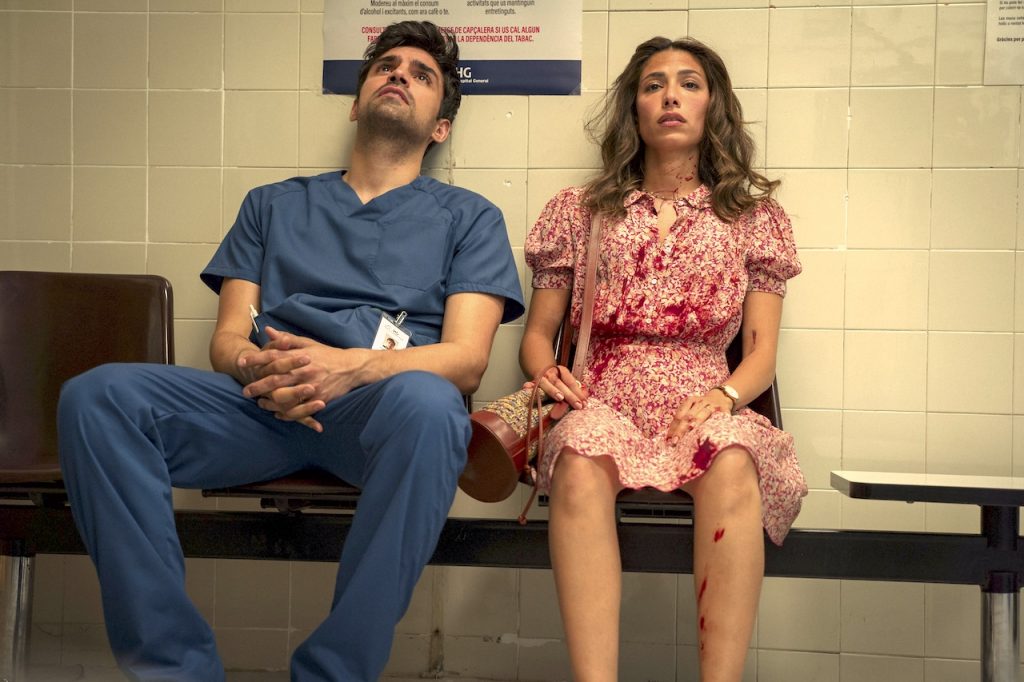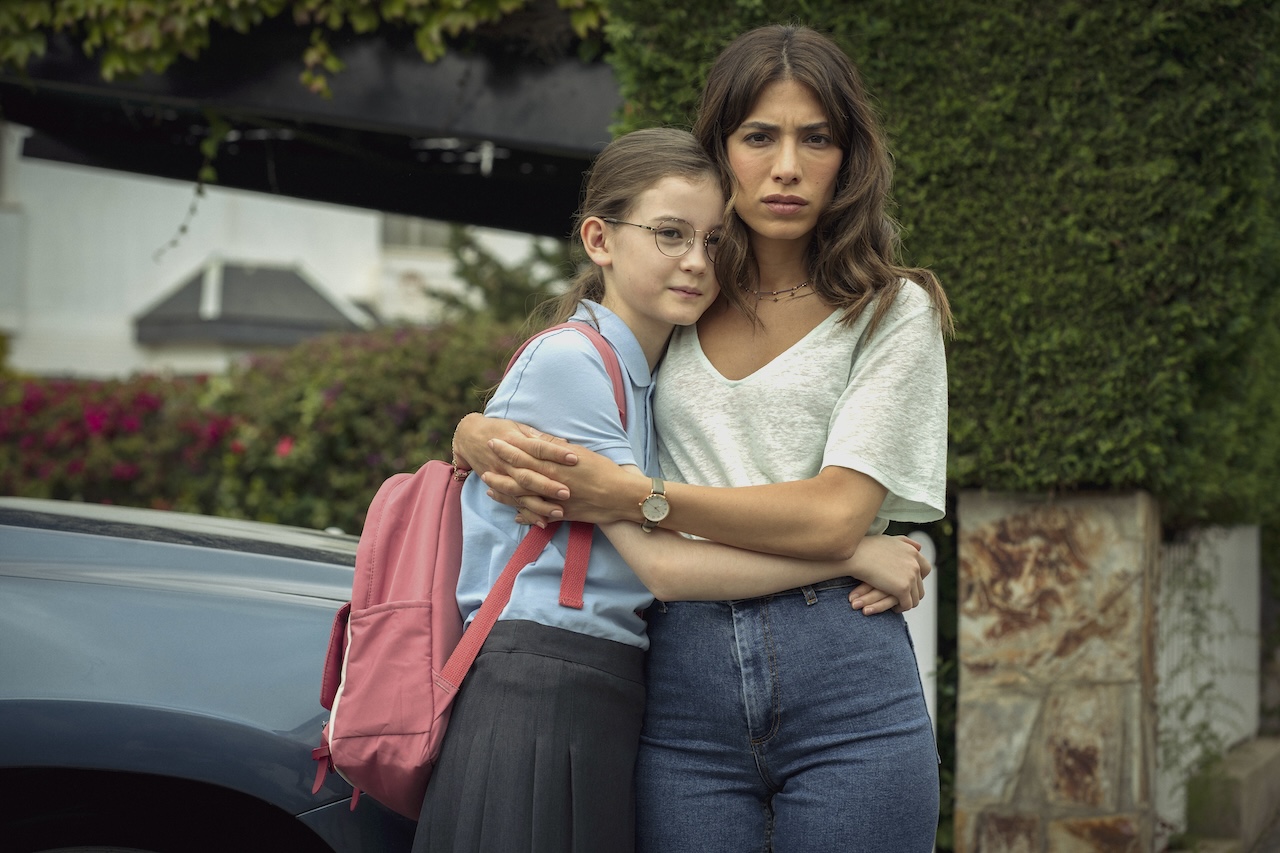What was the inspiration behind Erin Carter?
It was throwaway line in another script I was working on where a character mentions how she went on the run and how she’s a teacher now — The children call me Mrs. Jones — and it came with a nice cutaway of the teacher writing her name on the board and turning around to smile at the off-screen class.
I ended up cutting it from that script, but the idea stuck with me as something that might be fun to explore.

Jack Lothian
The idea of a person with a dark past trying to start anew, but the past catches up with them is a familiar story. Describe how you honored those story tropes and how you subverted them to make them your own.
They’re always a little tricky as the audience knows there’s something up with the main character, otherwise the show just wouldn’t exist. But I liked the idea of taking that kind of story and transposing it into a brighter, sunnier environment; the neighborhood, the school, the local swimming pool and tennis courts.
Describe your writing voice.
There’s usually an element of black comedy in there; that dark humor that comes from dramatic situations and how we don’t always react to them in the way we’d expect. I’ve been lucky to work on a lot of TV shows and written across different genres for them; medical dramas, police procedurals, action shows, comedy shows, horror… but I suppose that’d be the connecting tissue between them all.
I love dialogue as well, although I tried to strip it back more on this and make it more banal at the start — everyone is playing a role and they’re saying what they think they should be saying, rather than what they want to say.
Describe the tone, mood, and energy of your show?
The action gets quite heightened at times, but I wanted to keep the emotions grounded. At the heart of it, it’s a big messy metaphor for parenthood and responsibility, so that was important to try and keep that side of it a bit more real and honest.
It was pitched it as a TV show that would move past and chew through a lot of plot. I’m genuinely a big fan of Jackie Collins’ novels, there’s a real wit and verve to them and she’s incredibly skilled at marrying character, plot and humor. I’m not saying I’m anywhere close to her in terms of talent, but that was something at the back of my mind — something that could fall between Jackie Collins and eighties’ Hong Kong action films. I think I probably pitched more as Jason Bourne meets Desperate Housewives.
It was sold as an action show and I was lucky to work with a lot of the same team I’ve worked with on other shows — people like Paul Shapcott who is a brilliant stunt co-ordinator — so right from the start we knew we wanted to try and push the scale and intensity of the action as much as we could.
But the key was always about trying to keep the emotions grounded. Erin’s someone who’ll go to any lengths to protect her family life while starting to realise that the greatest danger to her family is probably herself.

Jordi Collantes (Sean Teale) & Erin Carter (Evin Ahmad) Photo courtesy of Netflix
How did you break the show in the writers’ room from blue sky idea, to outline, to episode breakdown to script?
We didn’t have a writers’ room on it, partially due to Covid, but also because in the UK we don’t really do those long extended writing rooms. I had a road-map from the start, though, which I included in the pitch document — it had the structure for the series and the main plot points of each episode. I’d already written the first episode, so I knew more or less where it was going and how we were going to get there.
I wrote six of the episodes and Fred Armesto and Adam Gyngell wrote the third episode which I did a polish on. The overall structure and plot didn’t change that much from the initial pitch, though.
How did you balance character with plot to ensure that both progressed at a fast pace without losing the audience trying to keep up?
I was coming off the back of three seasons of showrunning Strike Back for Cinemax/ Sky. I wrote thirty episodes in a row on that and had hit a certain structure where we chewed through a lot of plot and action in each episode, so I wanted to see if that would work with a more domesticated story which threw up its own wrinkles.
Generally, I feel if audiences are having fun and engaged, they’ll go along for the ride at whatever pace it’s working. The show seems to have done quite well so hopefully we got the balance right.
Describe how key aspects of Erin’s past are drip-fed key so you balance maintaining her secrets with gradually unveiling them, and balancing the back story with the forward story.
That’s always the tricky part of mysteries — how much do you feed the audience, how much do you with-hold — and it was a big part of the discussion with Netflix.
I thought it’d be interesting to give the audience the answers earlier than expected which gives the second half of the series a bit more drive. You now know where she came from, and what she did, and you’re seeing how everything is catching up with her.
What were the most difficult aspects of the TV series to write?
Overall it’s probably the credibility aspect. There was a balancing act between what is fun and what’s realistic. Towards the end, the main character finds herself blood-splattered and injured and at a high society party where nobody pays any attention to her. It was meant to be a little satirical about how self-obsessed the neighbors are, but I’m not sure it quite translated that way. It’s one of these moments that needed to be properly earned and I’m not sure I’d quite pulled it off in terms of script.
Is there a moment in the series that defines the essence of it.
There’s a scene where Erin has to do a parent-teacher evening and sit across from a parent of a child in her class… who also happens to have killed someone close to her. And, even worse, this parent knows she knows. They’re initially trying to play their roles — parent and teacher — but as it progresses, there’s a much darker conversation coming into play.
I think that scene probably encapsulated the clash between the domestic and crime sides of the show.
Who is Erin Carter and how should the audience feel about her given what she’s done and capable of doing?
I always hoped the audiences would start to feel a little conflicted about her as the show goes on. She’s not the hero that you might think she is and, from a certain point of view, she’s the villain of the piece. She’s done some terrible things. But, by the end, hopefully she’s done enough to redeem herself.
